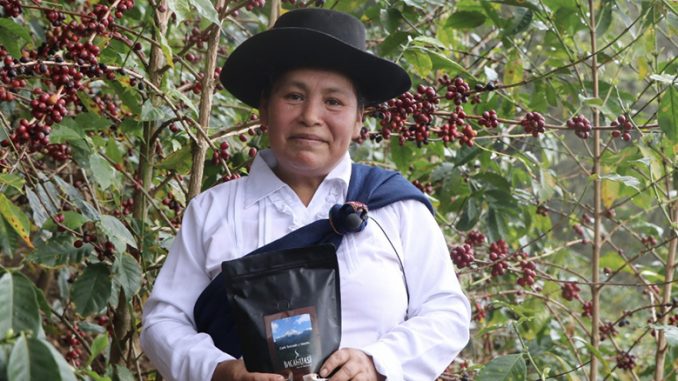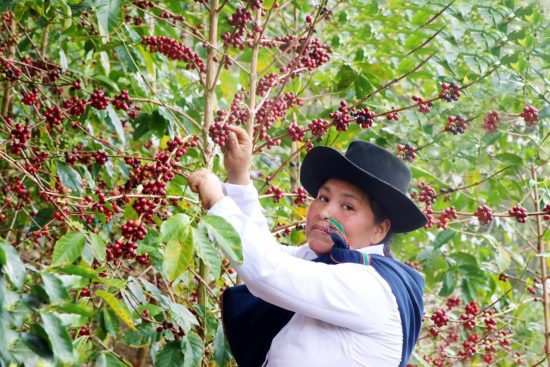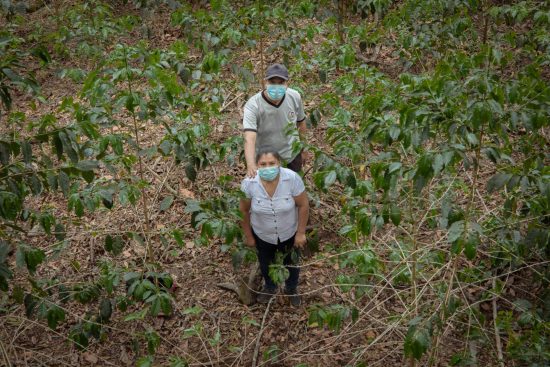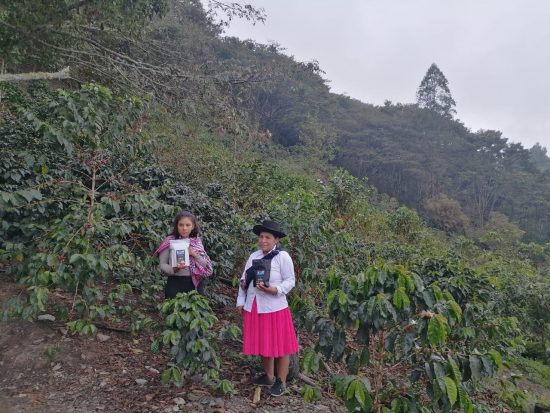
We learn more about the winning varieties from Hilda and her husband, Cirilo, ahead of this week’s upcoming Cup of Excellence auction.
BY KATRINA YENTCH
BARISTA MAGAZINE ONLINE
Photos courtesy of Alliance for Coffee Excellence
It’s inspiring to watch producers hone their craft by growing some of the most delicious coffees in the world, especially despite the setbacks of a pandemic. Following the success of the first Ethiopia Cup of Excellence (COE) and other COE events this year, the nonprofit Alliance for Coffee Excellence continues with another COE competition for Peru. Twenty-four submissions were crowned as winning coffees, and Hilda Leguía Gonzales’ coffee placed first—a washed offering containing 50% Gesha and 50% SL-09, which scored 90 points. Hilda grew the coffee on her farm, called Esperanza in Cusco, at 1,848 meters above sea level, and tasting notes from the judges included peach jam, with a round and silky body, and complexity and creaminess.
“I feel happy and excited … I want to thank all my family, especially my husband and children, whom have worked next to me unconditionally,” said Hilda in a public statement following the announcement. “Also would like to thank the cooperative Valle de Incahuasi, the manager and technicians who helped me in this journey through many adversities. We have changed to work with specialty coffees about three to four years ago, implementing all the care needed, and our next step is to plant more Gesha coffee plants in the following years.”
We spoke more with Hilda about what went into growing these coffees for the competition, and heard from both her and her husband, Cirilo, who helps on the farm, about what the Cup of Excellence has meant for them.

Katrina Yentch: What made you interested in coffee, and what was fun about growing this specialty coffee?
Hilda Leguía Gonzales: We are dedicated to the cultivation of coffee and the timing of carrying out the tasks such as harvesting, fertilizing, and bagging; we meet among partners and in a very pleasant and fun way we carry out all the activities that our harvest requires, with great joy and much happiness.
Cirilo: In the first place, she is the one that is dedicated to the farm and it is her job. We’ve been dedicated to the growing of coffee, maybe because it helps to support our family. My wife, since she was a child, she has grown up surrounded by coffee plants and she is used to it because of the example of her parents; she really enjoys the farm work. Before it was more rustic and they did not use fertilizers, the plants grew organically, the cherry fell onto the ground and the seeds wherever grew roots.
We are currently part of a cooperative and we have begun to implement more technique practices; now we plan our harvest, the place where each plant will go, and we have now a greenhouse to grow the seeds. Also, we have learned the correct way of fertilizing the soil by cutting the old trees.
The joy and fun we found, it is mainly when we meet with our friends, family, and neighbors to pack the coffee, and also for the harvest we rotate farm to farm helping between the community.

What was the most important thing you focused on when growing this coffee?
Hilda: I remember since I was a child my parents were dedicated to the cultivation of coffee; since then I wanted to follow in my father’s steps so I bought a piece of land to be able to plant my coffee and dedicate myself to this crop. And since I have been able to earn some income and educate and support my kids.
Cirilo: When she started with her own farm, she started to plant Typica coffee, but when the yellow coffee rust came to Peru my wife had to replace all of the plants for some sorted seeds the cooperative gave her. Between these seeds there was Gesha and SL-09, varieties that from the beginning gave good results, and what she is now doing with the support of the cooperative is planting more Gesha plants, because those are the ones that are better received by the clients.

What is special about Peruvian coffee and the half Geisha/half SL-09 that you chose to enter into the contest?
Cirilo: As I said before, we belong to a cooperative, which taught us the technical skills, the improvements, and the changes that needed to be done in order to increase our quality. On the other hand, the cooperative provided us with specialized cuppers who cupped our coffee and saw the potential there was, together with the experience they had in previous years in this and other competitions, with respect to Gesha coffees and the demand that this variety has. They (saw) high scores and the different profiles the judges found in these coffees. For this reason, we decided to participate in the Cup of Excellence this year, but even when we knew it was a good coffee, we never even imagined to be the winners of the competition. It was a great surprise for all of us.
How would you describe the flavors of your coffee?
Hilda: Aromatic. This coffee is different from the other coffees; it is smooth and has notes like honey. It definitely is different and has more aromas … we like it because of its sweetness; we can even drink it without sugar.
The auction begins this week on December 3. Find out more information about all the winners here.

